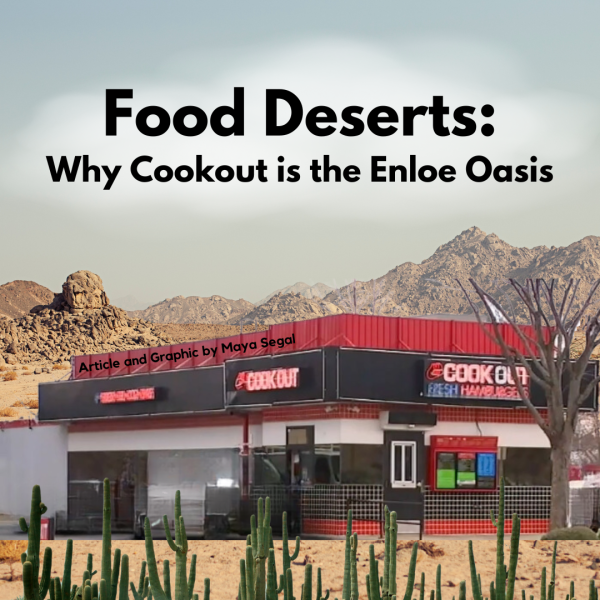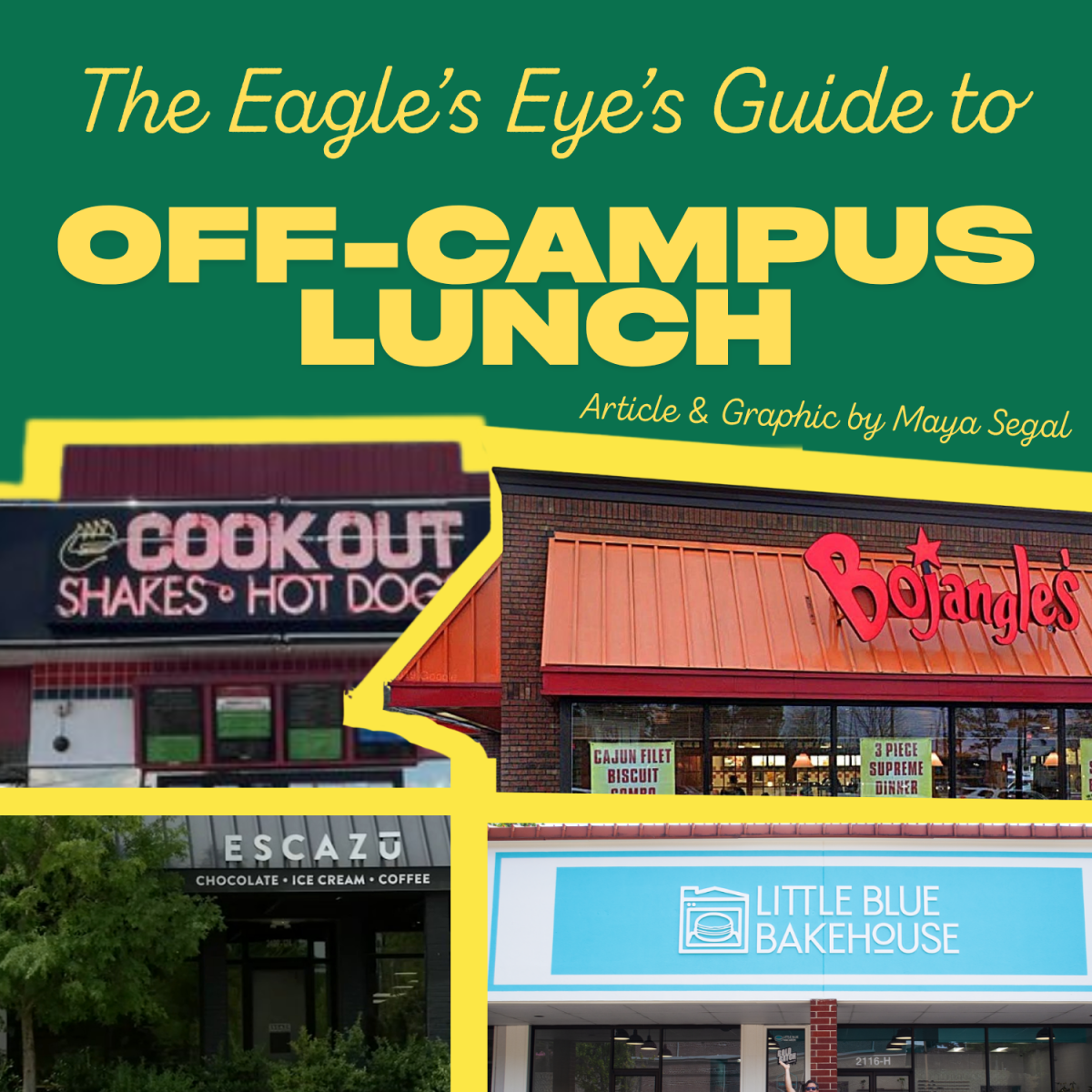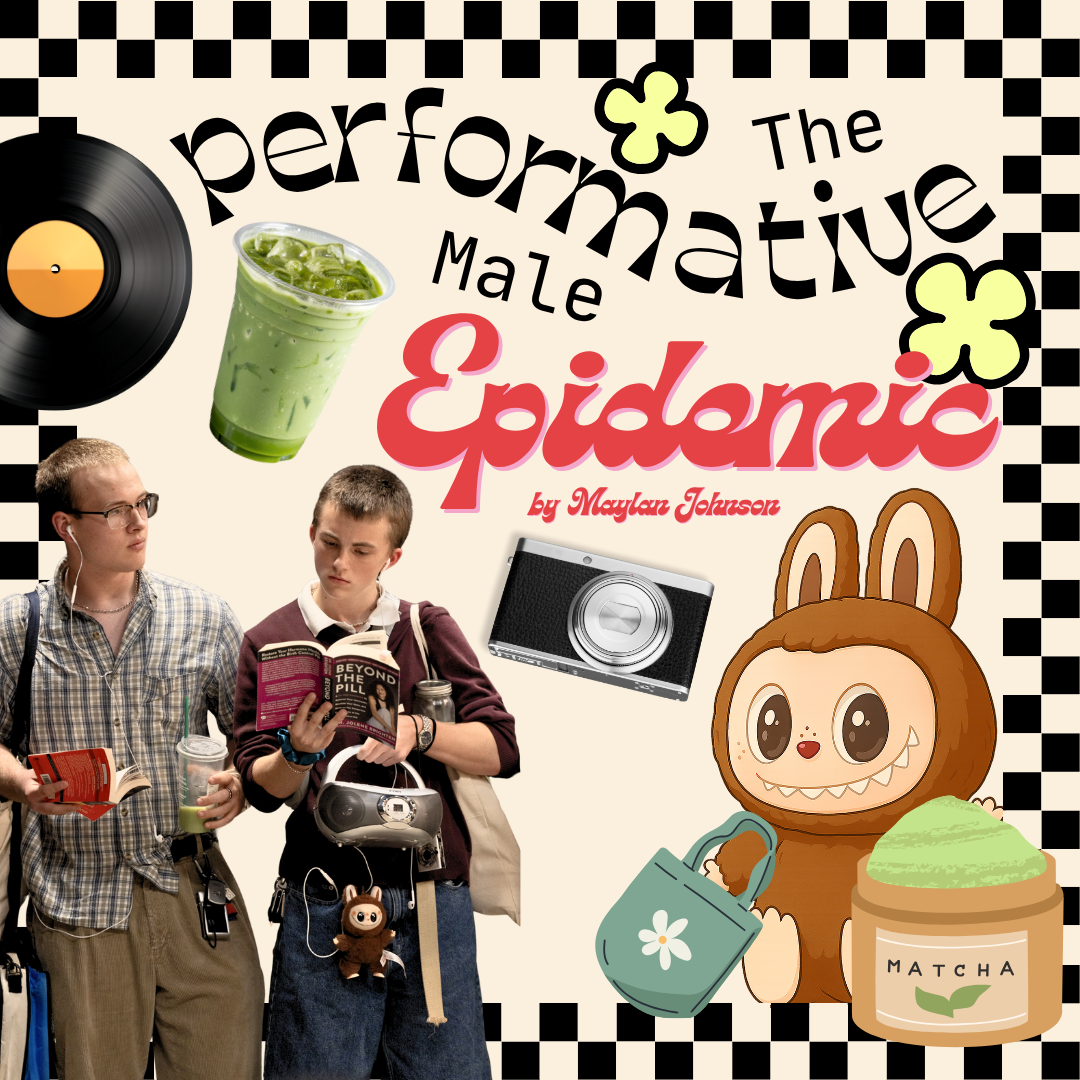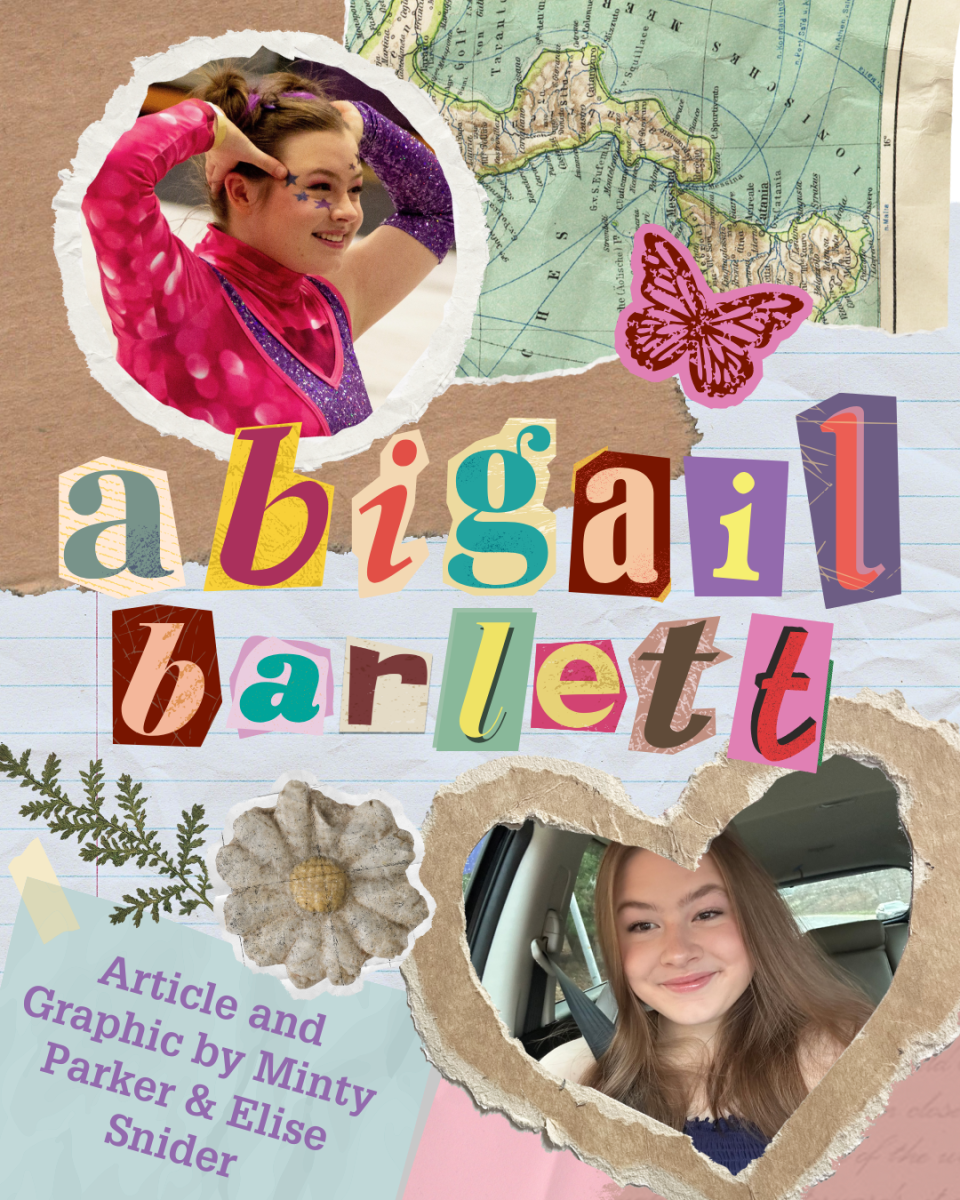
It’s practically an Enloe rite of passage to get food at Cookout, whether during lunch or after school. But Enloe students often complain about how the only places they have time to go to during lunch are Cookout and Bojangles, and maybe McDonald’s if they hurry. Meanwhile, Broughton is within walking distance of the Village District, giving their students a plethora of healthier and fancier options. So what causes this disparity?
It comes down to food deserts. The United States Department of Agriculture (USDA) reports on “areas in the United States where people have limited access to a variety of healthy and affordable food. Commonly referred to as ‘food deserts,’ these regions of the country often feature large proportions of households with low incomes, inadequate access to transportation, and a limited number of food retailers providing fresh produce and healthy groceries for affordable prices.”
Food deserts are found in “urban and rural low-income [neighborhoods, as they] are less likely to have access to supermarkets or grocery stores that provide healthy food choices,” according to the US National Institute of Health. The USDA estimates that about 53.6 million people, or 17.4% of the population, reside in a food desert. There are over 6,500 food deserts in the United States, including one encompassing Southeast Raleigh. The area surrounding Broughton is not a food desert.
It’s important to note the distinctions between various terminologies surrounding this topic. While people in food deserts struggle to obtain nutritious foods, those in food swamps do have access to fruits, vegetables, and other healthy options, but the offerings are far outnumbered by junk foods and soft drinks found at fast food restaurants and convenience stores. Food insecurity, meanwhile, is defined as a “lack of consistent access to enough food for a healthy, active life.” It is a much broader term and could, but doesn’t necessarily, apply to people in food deserts and food swamps. Lastly, some people prefer the term “food apartheid” over “food desert” because these regions disproportionately affect Black and Brown communities.
Southeast Raleigh is a food desert because it houses a severe lack of accessible supermarkets, yet a plethora of readily available junk food. The zip code 27610, which consists of the Southeast section of Raleigh and Wake County and is 64% Black, contains only 11 regular grocery stores for 78,475 residents, or one store per 7,134 people. The closest chain supermarket to Enloe is a Food Lion one mile away, but for people who don’t own a car, it can be a literal hike to get there. Transportation is a major issue in urban food deserts. Low car ownership and unreliable public transportation make it so that people lack the means to get to a grocery store—even if it doesn’t seem very far away on a map. Since food deserts are primarily found in low-income neighborhoods, once people make it to these stores, they often still can’t afford to purchase fresh groceries, as they are usually more expensive than the less healthy alternatives. In Southeast Raleigh, places like McDonald’s, Cookout, Chick-fil-A, and Bojangles are much cheaper and more prevalent. Thus, they experience a lot of business—good for profit, but bad for those who repeatedly turn to these restaurants instead of more nutritious sustenance.
Consistently eating foods that are high in salt, sugar, carbohydrates, and trans fats can increase the chances of type two diabetes, cardiovascular disease, high blood pressure, obesity, various types of cancers linked to obesity, and other health issues. This shouldn’t be a huge concern for the Enloe students who occasionally stop at Cookout. However, for those who live in food deserts and can’t easily access supermarkets or healthier restaurants, a large part of their intake may be foods like this, setting them down a detrimental path.
But that isn’t to say that all hope is lost. While there may not be a clear solution to food deserts, there are many ways to combat them, both governmental and community-oriented. Community gardens provide fresh fruits and vegetables while also helping communities take initiative on their health and educating those involved about agriculture. At farmer’s markets, customers buy produce directly from the growers, which supports the local economy and ensures that the money goes directly back to the recipients instead of a third party. Some organizations may enact surplus food sharing, where food is more evenly balanced between wealthy neighborhoods and food deserts. Other groups may take produce that is dismissed at grocery stores due to blemishes or deformities—but that is still fine to eat—and resell it at lower prices in a process known as food rescue. The federal government also sponsors some programs to help those affected by food deserts. The Supplemental Nutrition Assistance Program (SNAP) supplements the grocery budget of low-income families, and the Special Supplemental Nutrition Program for Women, Infants, and Children (WIC) provides monthly nutrition packages, as well as benefits for children up to five years old and women who are nursing. However, many organizations recognize that government assistance may not be enough or reach a wide enough audience, so they start their own initiatives. For example, Meals on Wheels delivers food to seniors, the disabled, and other eligible people, and Food Not Bombs offers free vegetarian and vegan meals around the globe. Local food banks and soup kitchens—often run by religious entities—also aim to help those in need of food assistance (and can be a great place to volunteer).
Southeast Raleigh highlights many of these approaches. Grocers on Wheels is a mobile market that travels to supply food, especially produce, to those with limited access. Another initiative is The Black Farmer’s HUB, a superfood store that aims to increase the availability of natural foods while also supporting vendors of color. The Fertile Ground Food Cooperative works to cultivate food security, provide dignified jobs and wealth-building opportunities to a historically Black community, and enhance the quality of life in Southeast Raleigh by investing in community-owned grocery stores and gathering spaces. Yet another effort is Galley Grocery, run by Ship Outreach and Community Center, which provides healthy food options at a subsidized rate.
It’s not just adults that can tackle this issue. Enloe’s Food Ark maintains the Enloe gardens and supports the Enloe Food Pantry, as well as local food banks. Food Ark grows grapes, squash, zucchini, tomatoes, carrots, and peppers, among other plants. Though most produce is pretty healthy on its own, Food Ark takes into account how the products typically get used and cooked. For example, “While [potatoes themselves aren’t] going to be unhealthy, potatoes are often cooked in a lot of oil, and so we don’t grow as many potatoes… we try to grow a good amount of leafy greens… and things that are more commonly eaten raw,” says Julianna Saunders, President of Enloe Food Ark. The intention is to “support the community not just short-term, but also long-term.” Saunders adds, “I think that we have affected a lot of the Enloe lives here, more than people probably realize.” She notes that this impact is especially critical amidst “the gentrification of the Raleigh area, [which] has a whole separate effect on soil erosion… it has created some massive effects on the area not only socially, but also ecologically.” The Enloe Food Ark is part of a wider Food Ark program, but most of the other schools involved are not located in food deserts. “Enloe is not only a magnet school but it’s also a neighborhood school, so we have a lot of kids from this area going to our school… and a very significant [number] of parents use the food pantry.” Knowing that this issue is personal for many members of the school community “adds to our drive to be able to be a successful club… [it’s] the reason why we keep the club going and make sure that it stays strong,” Saunders concludes.
Food deserts are a critical issue facing not just the community surrounding Enloe, but the country as a whole. All of these strategies to bring them to an end are crucial for those living in food deserts, and hopefully, Southeast Raleigh will one day be transformed into an area with abundant nutritious food. But until then, Cookout—with its appealing french fries, burgers, and milkshakes—will continue to be the go-to spot for Enloe students and Southeast Raleigh residents alike.







